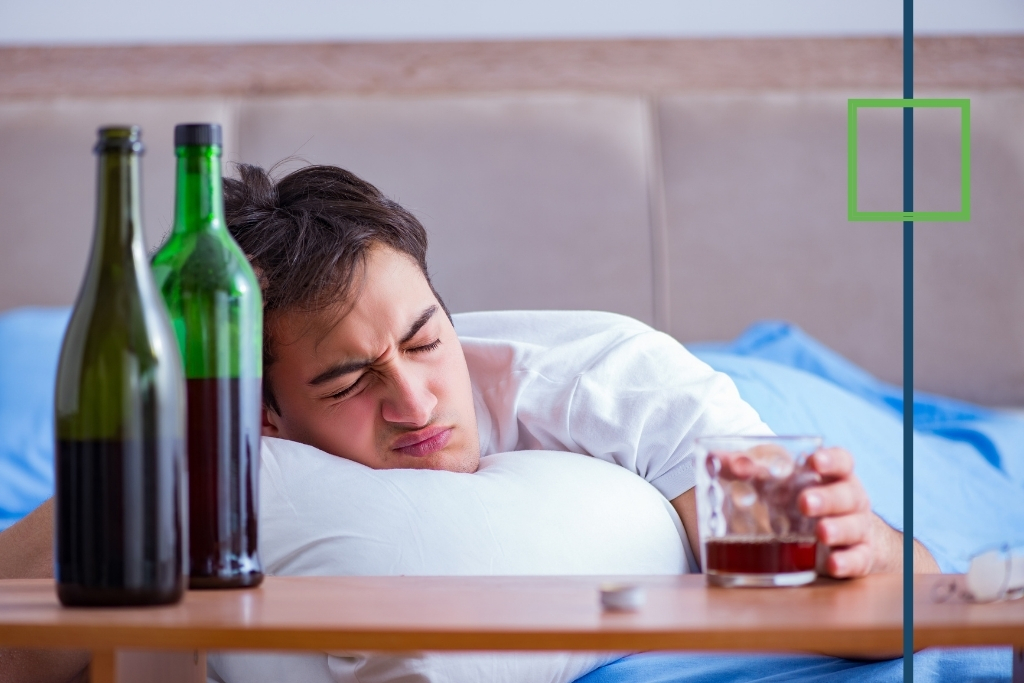What Causes Alcohol Withdrawal?
Every year more than one and a half million people in the United States either enter alcoholism treatment or are admitted to a general hospital because of medical consequences resulting from alcohol dependence [1]. These patients, as well as a substantial number of other people who stop drinking without seeking professional treatment, experience the effects of alcohol withdrawal.
Heavy drinkers who suddenly decrease their alcohol consumption or abstain completely may experience the effects of alcohol withdrawal. Signs and symptoms of AW can include, among others, mild to moderate tremors, irritability, anxiety, or agitation. The most severe manifestations of withdrawal include delirium tremens, hallucinations, and seizures. These manifestations result from alcohol-induced imbalances in the brain chemistry that cause excessive neuronal activity if the alcohol is withheld.
Managing the effects of alcohol withdrawal includes a thorough assessment of the severity of the patient’s symptoms and of any complicating conditions, as well as treatment of the withdrawal symptoms with pharmacological and nonpharmacological approaches. Treatment can occur in both inpatient treatment and outpatient settings. Recognition and treatment of withdrawal can represent a first step in the patient’s recovery process.


Get Your Life Back
Find Hope & Recovery. Get Safe Comfortable Detox, Addiction Rehab & Mental Health Dual Diagnosis High-Quality Care at the We Level Up Treatment Centers Network.
Hotline (877) 378-4154Timeline of the Effects of Alcohol Withdrawal
The effects of alcohol withdrawal timeline start as early as two hours after drinking, peaking in severity approximately two to three days after the last drink. Alcohol withdrawal symptoms can last for up to a year after quitting, although this tends to be limited to temptation and relapse. The variety of symptoms changes, depending on the amount of time since someone last consumed an alcoholic drink.
6 to12 Hours After Quitting Alcohol
During the first six to twelve hours of the alcohol withdrawal timeline, symptoms begin setting in roughly at hour six. That is the reason why many alcoholics have to start drinking the moment they wake up. Since the symptoms are so severe, many wrongly assume that the 6-12 hours stage is the most dangerous, but that is the 24-48 hours phase in reality.
Symptoms include, but are not limited to:
- Cravings
- Alcohol is an addictive drug or substance. So naturally, when a person suffering from alcohol use disorder does not have it, they crave it. Unfortunately, cravings are terrible at this stage since the person knows that drinking would relieve all the unpleasant effects of alcohol withdrawal.
- Anxiety
- Throughout the initial stage of the alcohol withdrawal timeline, an individual’s mind and body are all out of whack. A person will feel sick, uncomfortable, hurt, and various other bothersome symptoms that can increase a person’s anxiety. For those who already experience high anxiety, these feelings will be doubled.
- Extreme Sweating
- The body begins to overheat when alcohol is no longer in the system. Sweating is the body’s attempt to protect and cool down the organs. Sweating through your bedsheets is expected, so keeping a high fluid level is so important to the doctors who are monitoring the process.
- Headaches
- It is usually caused by loss of body fluid and dehydration.
- Insomnia
- Alcohol does change the way a person sleeps; skipping the initial phases of sleep and dropping straight to REM helps someone fall asleep, but it doesn’t produce healthy sleep. In this stage of the alcohol withdrawal, the mind may want to sleep but be incapable, either from restlessness or other symptoms.
- Nausea/vomiting/diarrhea
- Extreme drinking changes the intestine walls and the amount of stomach acid the body produces. As a result, nausea is quite common during this stage of the alcohol withdrawal.
- Shakes
- When the brain starts to function on overdrive without the alcohol’s depressant effects to counteract this hyperactivity, the brain has trouble working normally, causing malfunctions in nerve cell activity, leading to tremors and shakes.
12 to 24 Hours After Stopping Drinking
In Stage 12-24 hours of the alcohol withdrawal, the person may see a continuation of the previous symptoms in addition to some new symptoms. This trend may continue with each following stage.

- Dehydration
- Dehydration really sets in at this stage of the alcohol withdrawal timeline due to trips to the bathroom and sweating. The advantage of an inpatient detox program is the capability to have medical professionals monitor the levels of care and make sure the person has enough fluids.
- Hallucinations
- Low blood sugar combined with extra dopamine release often results to hallucinations. Although these can be very disorienting or upsetting, hallucinations are not life-threatening.
- Malnutrition
- As the body experiences all these uncomfortable symptoms, the last thing on someone’s mind is food. A loss of appetite should not be surprising for someone dealing with nausea.
Get Help. Get Better. Get Your Life Back.
Searching for Accredited Drug & Alcohol Rehab Centers Near You? Or Mental Health Support?
Even if you have failed previously, relapsed, or are in a difficult crisis, we stand ready to support you. Our trusted behavioral health specialists will not give up on you. Call us when you feel ready or want someone to speak to about therapy alternatives to change your life. Even if we cannot assist you, we will lead you wherever you can get support. There is no obligation. Call our hotline today.
FREE Addiction Hotline – Call 24/724 to 48 Hours Post Drinking
As mentioned above, this is the most dangerous and crucial part of the alcohol withdrawal timeline. At this phase, the alcoholic’s body is in full panic mode and can have some severe reactions to the absence of alcohol in the system.
- Irritability
- At this point of the alcohol withdrawal timeline, mood swings are not unusual. The person is anxious uncomfortable, and their body and brain feel like they are going haywire. Any patience or discipline they might have had initially had already faded, if not completely diminished.
- Low Blood Sugar Levels
- Alcohol use disorder usually leads to alcoholic liver cirrhosis and alcoholic hepatitis. When the liver does stop functioning, it fails to release glucose into the bloodstream. Hypoglycemia is a typical effect of alcohol withdrawal at this stage, This leads o exhaustion and weakness.
- Grand Mal Seizures
- Approximately four out of a hundred individuals will experience grand mal seizures in a day or two after quitting. The effects of alcohol withdrawal , particularly, seizures arise from sleep, water, and nutrient deprivation. For some, these seizures can be a warning sign of a much more alarming and dangerous effects of alcohol withdrawal known as Delirium Tremens.
- Delirium Tremens
- The possibly deadly effects of alcohol withdrawals, Delirium Tremens, is a sudden case of extreme confusion followed by sweats, shivering, seizures, overheating, hallucinations, and in some instances, death. During this period of the alcohol withdrawal, the body is experiencing a biochemical decline where the brain is malfunctioning and firing off incorrect signals.
48 to 168 Hours Post Drink
At this stage of the alcohol withdrawal timeline, most physical symptoms have softened if not completely disappeared. Most of these are replaced by mental distress and feelings of anxiety, depression, confusion, restlessness, anger, and others. Now, in recovery, the client will learn to express and manage these feelings as well as coping ways to combat relapse.
PAWS (Post-Acute Withdrawal Syndrome) refers to the long-term side effect of alcohol abuse, potentially challenging and affecting a person’s life. Symptoms might continue years after withdrawal and initial detox. That is why it is highly recommended to continue treatment after the initial seven-day detox.
These symptoms include:
- Hostility
- Irritability
- Anxiety & Depression
- Mood swings
- Low levels of energy
- Fatigue
- Insomnia
- Inability to focus
- Lack of sex drive
- Chronic pain
These symptoms are mainly psychological and have been known to continue for months or years after alcohol cessation. They tend to ‘come and go’ in waves or episodes, and can be triggered by specific circumstances, memories, smells, or people.
Common Effects of Alcohol Withdrawal
If you’ve been regularly drinking excessively and you stop drinking suddenly, you may experience one or more effects of alcohol withdrawal. Depending on your past alcohol use, these symptoms can range from mild and uncomfortable to severe and potentially life-threatening.
Though symptoms typically begin within eight hours after your last drink, you may not experience any until several days later. These symptoms tend to spike around 24 to 72 hours after your last drink, though milder ones may persist for much longer in some people [2].
Common symptoms include:
- Feeling anxious or nervous
- Feeling irritable
- Feeling depressed
- Feeling wiped out and tired
- Shakiness
- Mood swings
- Not being able to think clearly
- Having nightmares
- Dilated pupils
- Sweating
- Headache
- Difficulty sleeping
- Nausea and/or vomiting
- Appetite loss
- Faster heart rate
- Pale skin
- Tremor
Comfortable Facilities & Amenities
High-Quality Addiction & Mental Health Rehabilitation Treatment
Rehab Centers TourRenowned Addiction Centers. Serene Private Facilities. Inpatient rehab programs vary.
Addiction Helpline (877) 378-4154Proven recovery success experience, backed by a Team w/ History of:
15+
Years of Unified Experience
100s
5-Star Reviews Across Our Centers
10K
Recovery Success Stories Across Our Network
- Low Patient to Therapist Ratio
- Onsite Medical Detox Center
- Comprehensive Dual-Diagnosis Treatment
- Complimentary Family & Alumni Programs
- Coaching, Recovery & Personal Development Events
Severe Effects of Alcohol Withdrawal
One of the most severe effects of alcohol withdrawal is called delirium tremens, or “the DTs.” About 3% to 5% of people who withdraw from heavy drinking experience delirium tremens. This condition can become fatal if it’s left untreated, so if you or a loved one show any symptoms of the DTs, seek emergency treatment because symptoms can get worse.
Symptoms of delirium tremens include:
- Fever
- Extreme agitation
- Seizures
- Extreme confusion
- Hallucinations (feeling, seeing, or hearing things that aren’t there)
- High blood pressure
Hospitals and detox centers have experienced staff who are familiar with these symptoms and have the tools to provide appropriate treatment.
Can Alcohol Withdrawal Be Fatal?
Severe effects of alcohol withdrawal can actually lead to death during the addiction recovery process. This can happen in a number of different ways, most commonly among alcoholics attempting recovery without medical supervision.
Ask any recovering alcoholic and they may tell you that the detox process often made them feel as if they were dying. Of course, we do know that withdrawal itself is not a cause of death. However, there are two notably concerning effects of alcohol withdrawal that are linked to the occasional death of recovering alcoholics.
Seizures: Those who have been drinking heavily for several years are more likely to experience seizures during the detox and withdrawal process. This can lead to choking, aspiration, or physical injury due to uncontrollable convulsions.
Delirium Tremens: Otherwise known as “DTs,” this serious condition presents a number of dangerous symptoms of withdrawal, such as confusion, disorientation, hyperactivity, seizures, heart attack, and stroke.
Diagnosing Alcohol Withdrawal
Your doctor will review your medical history, ask about your symptoms, and conduct a physical exam. Some signs your doctor will look for include:
- Hand tremors
- An irregular heart rate
- Dehydration
- Fever
Your doctor may also perform a toxicology screen, which tests how much alcohol is in your body.
The Clinical Institute Withdrawal Assessment of Alcohol (CIWA-Ar) is a series of questions used to measure AWS. Healthcare professionals may use this test to diagnose AWS. It can also be used to determine the severity of your symptoms. The scale measures the following 10 symptoms:
- Agitation
- Anxiety
- Auditory disturbances
- Clouding of sensorium, or the inability to think clearly
- Headache
- Nausea and vomiting
- Paroxysmal sweats, or sudden, uncontrollable sweating
- Tactile disturbances
- Tremor
- Visual disturbances

It’s important to note that the Clinical Assessment mentioned above may be unreliable because it is subjective in nature. According to a 2017 study [3], the use of the Objective Alcohol Withdrawal Scale (OAWS) was more useful for treatment because it can be used as a framework and tailored to individual cases.
Questions a medical professional may ask include:
- Who am I?
- What day is this?
- Does it feel like there is a band around your head?
- Do you feel sick to your stomach?
- Do you feel bugs crawling under your skin?
World-class, Accredited, 5-Star Reviewed, Effective Addiction & Mental Health Programs. Complete Behavioral Health Inpatient Rehab, Detox plus Co-occuring Disorders Therapy.
CALL (877) 378-4154End the Addiction Pain. End the Emotional Rollercoaster. Get Your Life Back. Start Drug, Alcohol & Dual Diagnosis Mental Health Treatment Now. Get Free No-obligation Guidance by Substance Abuse Specialists Who Understand Addiction & Mental Health Recovery & Know How to Help.
Alcohol Withdrawal Treatment
Detox is often considered the first stage of treatment. It will help you navigate the complicated process of alcohol withdrawal, but it doesn’t address patterns of thought and behavior that contribute to alcohol use. Various treatment approaches and settings can help provide the ongoing support necessary to maintain long-term sobriety after you complete detox.
Cravings are very common during detox and can be challenging to overcome. This often leads to relapse. Constant medical care provided during inpatient treatment helps prevent relapse. Clinicians can provide necessary medication and medical expertise to lessen cravings and the effects of alcohol withdrawals.
Medication-Assisted Treatments
Medication-Assisted Treatments (MAT) for alcohol use disorder and mental health disorder are commonly used in conjunction with one another. This includes the use of medications and other medical procedures. During your rehab, the staff from your treatment facility will help you identify what caused your addiction and teach you skills that will help you change your behavior patterns and challenge the negative thoughts that led to your addiction. Sometimes, the pressures and problems in your life lead you to rely on substances to help you forget about them momentarily.
Integrated Mental Health Care
Alcohol affects mental health, so people may use it to self-medicate undiagnosed disorders. Rehab centers typically provide mental health screenings, diagnoses, and integrated treatment for co-occurring disorders. In addition, holistic and therapeutic approaches are often used to treat recovering addicts with these conditions.
Behavioral Therapies
Cognitive Behavioral Therapy (CBT) and Dialectical Behavioral Therapy (DBT) can improve addicts’ behavior. CBT targets negative and maladaptive thought patterns as it promotes positive emotions and beliefs, while DBT helps clients address conflicting impulses so they can make healthy choices. Both therapies treat substance abuse and mental health disorders. Therapy also empowers clients to identify, avoid and mitigate cues that trigger drug cravings.
Individual and Group Counseling
Addiction and mental health counseling occur in both individual and group settings. One-on-one treatment sessions may address unresolved trauma, unconscious conflicts, and specific struggles, while group sessions often involve training in life skills, stress management, conflict resolution, and social connections. Group counseling also gives clients the chance to share their thoughts and experiences to develop social support, which is essential for lasting recovery
Please, do not try to detox on your own because the detox process can be painful and difficult without medical assistance. If you or someone you know regularly exceeds these recommended daily limits or is experiencing effects of alcohol withdrawal, it is important to intervene early. We Level Up NJ has addiction specialists that are standing by to help.

Experience Transformative Recovery at the We Level Up Treatment Center.
See our authentic success stories. Get inspired. Get the help you deserve.



Start a New Life
Begin with a free call to an addiction & behavioral health treatment advisor. Learn more about our dual-diagnosis programs. The We Level Up treatment center network delivers various recovery programs at each treatment facility. Call to learn more.
- Personalized Care
- Caring Accountable Staff
- Comfortable Amenities
- Licensed & Accredited
- Renowned w/ 5-Star Reviews
